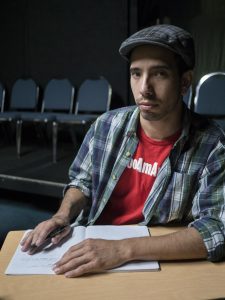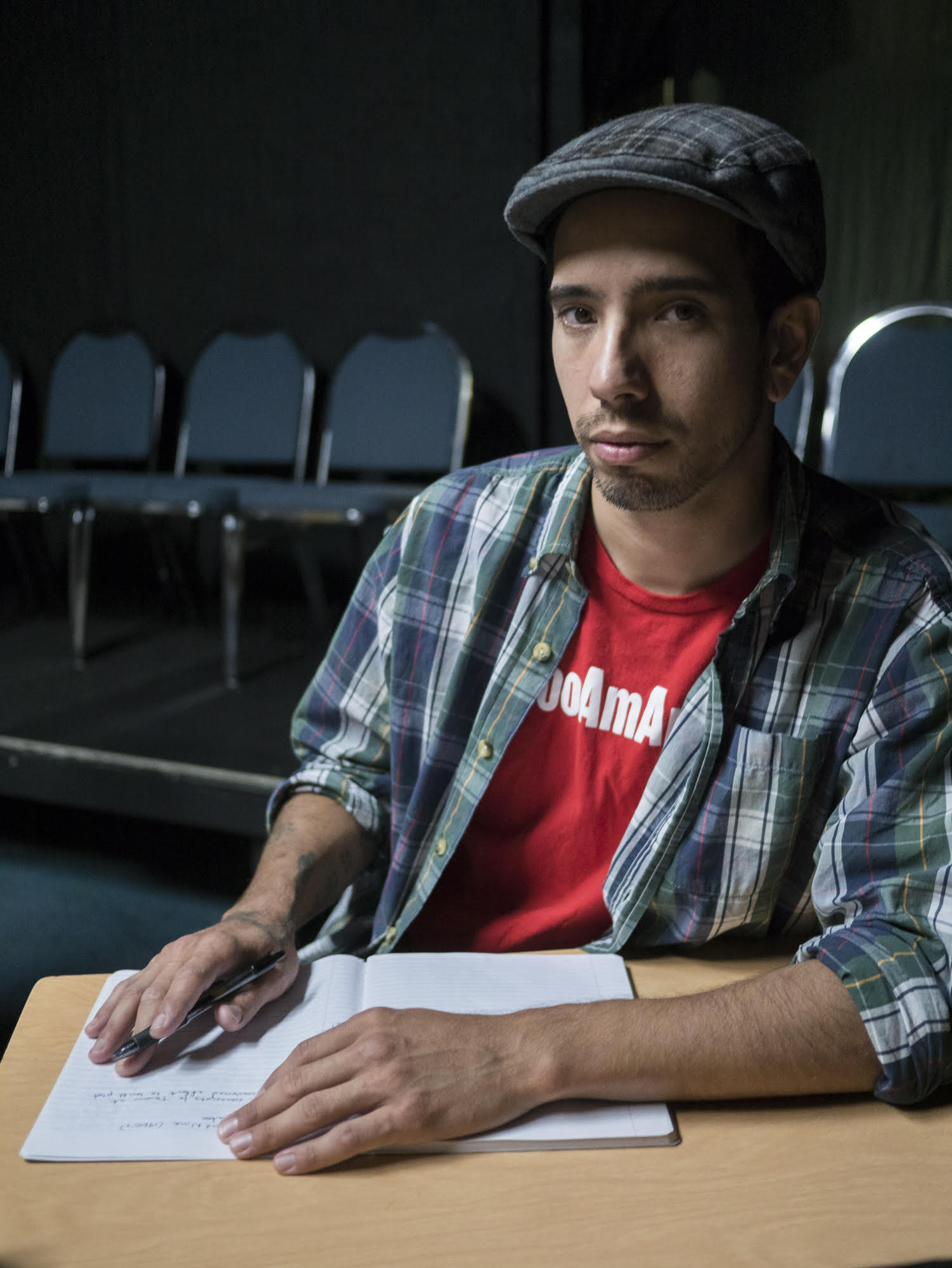Melchor Sahagun III: Poetry Past, Future, and Present
By Summer Krafft

Photo by Phil Johnson
Melchor Sahagun III has been a part of the Valley’s poetry scene for nearly twenty years. Born and raised in Stockton, he is a poet, playwright, performer, advocate, and coach for Stockton’s youth slam team that goes to Brave New Voices, the national teen spoken word competition, every year.
When he was young, his family began encouraging him in the literary arts. “My mom was the first advocate for reading. She gave me access to all kinds of books and allowed me to read whatever I was interested in. My brother was the first person I ever had advocating my writing. He was the first person to introduce me to a lot of the poetry that would be influential in my formative years. He was also the first person to introduce me to hip-hop music. He introduced me to underground hip-hip music, specifically, which became pivotal in my writing. Hip-hop is a huge influence on my approach to writing anything. I started trying to write rap verses. That’s kind of what sparked it. That’s when I remember being really prompted to write.” It is no coincidence that someone encouraged in that way so young would come to be a mentor and advocate in other young people’s lives.
Of working with the youth slam team, he says, “The challenges are basically a lot of the challenges of what you would expect from working with a group of teenagers. They’re very complex young people. Especially as poets, they have a lot going on mentally and emotionally, they’re very critical and analytical, so there’s always a lot on their mind. The come with their individual challenges. There are more highlights than challenges. Poetry has a particular affect to bring people together because it is so personal, and it’s so inward, that they become really close really quickly. It starts to stimulate their individual writing, and their writing in a group, and they’re in a place where they need that reinforcement for what they’re really passionate about. They take that opportunity better than even I could show them how to.” Melchor is also on the board of With Our Words, Inc., which is a literary non-profit focused on empowering youth through performance arts, particularly spoken word poetry.
In addition to being a writer, mentor, and advocate working in Stockton, Melchor is also a staple of the Modesto poetry community, which he counts as the warmest he’s ever encountered. In the past year alone, he has hosted and featured at The Queen Bean Coffee House’s Poetry Night, slammed several times at SLaM On RyE, and been featured in two of Center Stage’s spoken word fundraisers, as well as participating in many open mics. In fact, he has his next feature coming up on the evening of October 11th at The Barkin’ Dog’s poetry series. When I asked him what we could expect of his feature, he said, “It’s about relative distances between me and the world around me, and kind of the way that affects how I view my position in my various relationships to ideas, to people, to events, to philosophies. Also just focusing on how sad everything is sometimes. I’ll be reading a lot of stuff that I’ve been working on pretty heavily recently. I’ll probably talk about the paradox of sharing intimate, emotional parts of yourself with strangers, because that’s what it’s all about.”
His feature will be influenced by his recently finished poetry manuscript, of which he says, “I was just trying to use language, structure, and format as a way of conveying those things in an accessible way to try to reach at the things that I think I experience that other people do as well. I would really like to, in one way or another, publish a collection of work. I’d also just like to continue performing and widening my performance base, and widening my perspective on poetry and on the people who write it, read it, and listen to it. I hope that continues to inform my actions and advocacy for the arts as a transformative tool, that is horribly underutilized in America’s youth. We need more connection and the arts are the best way to connect to people.”
Another new credential Melchor recently added to his resume is playwright. He, two other writers, and I all co-wrote a play that premiered at Center Stage Conservatory’s Lower Level Studio in April of 2016. It was called Collecting the Echoes. “I have very seldom been given an opportunity to work in a truly collaborative effort, especially not in the last few years. It was really great to see the impact that can be made when working with other people. In so many areas of my life, my life is thinking is dominated by a sense of community. I try to hold that communal sense in the arts. The play was a great reinforcer of that as a beneficial thing for myself, for us, for the audience. The general vibe was of participation and creating something personal and communal. It was just a lot of fun. Everybody was able to share ideas in a setting where we had a high level of respect and trust for one another. Not a lot of people get to do truly collaborative work that benefits more than themselves. Just to see the good that produces in personal, philosophical ways. I feel very lucky to have been invited into a space like that and to have been able to see it I really enjoyed what came out of our work. It was some some of the most fulfilling and enriching stuff I’ve been able to produce. I just hope to work as hard as I can and reinforce the idea that art should be created together. It enforces connections and brings communities together.” After the success of Collecting the Echoes, Melchor and I will be joining forces again to write a new devised theater project for Center Stage that will premiere in April of 2017.
Of all the work he does, though, he counts his work with the teens of Brave New Voices as the most meaningful. “I think as a writer of predominantly poetry, it’s kind of a natural extension of that to feel really solitary and isolated. When you watch teenagers do something that you yourself did as a teenager, but have this outlet for it and have this group with which to bond with through the process…to see that, there’s not a person that would leave unaffected. As a writer of poetry, it’s easy to fall into this idea that it might not last. There’s always this worry that poetry might not last even though it has. It’s inspirational beyond reason. It was rekindling in my use of the arts as a tool of connection and growth for myself and my community. They made me realize the one thing the one thing I can use my efforts for and it won’t be in vain: to make things better for them than it was for me when I was their age.”









